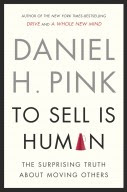 Best-selling author Dan Pink contributed today's post. His new book, To Sell is Human, occupies the No. 1 spot on the best-seller lists of The Wall Street Journal and The Washington Post; and the No. 2 spot on The New York Times.
Best-selling author Dan Pink contributed today's post. His new book, To Sell is Human, occupies the No. 1 spot on the best-seller lists of The Wall Street Journal and The Washington Post; and the No. 2 spot on The New York Times.What's the secret to a must-read email?
Researchers from Carnegie-Mellon University studied this issue by sitting with email recipients and asking them to narrate which emails they opened and why. The researchers' conclusions were stark: the most effective email Subject lines appealed to either utility or curiosity.
That is, the emails most likely to be opened had Subject lines that either:
- Indicated the email was directly related and relevant to the recipient's work; or
- Provoked a level of uncertainty that made the recipient curious about what the message contained
Since people have so much email these days, my approach is generally to use Subject lines that emphasize the usefulness of the email's contents—and emails themselves that are as concise as I can possibly create.
Perhaps the best advice is not to get caught in the mushy middle.
Craft the Subject line so that it's immediately clear that the contents of the email are useful (for example, “Three solutions to our paper supplier problem”). Or craft the Subject line so that it gets people curious (for example, “You're not going to believe what I learned about paper suppliers!”). But avoid falling in between those poles with Subject lines like "Followup," "Question" and so on.
The mushy middle is where emails go to die.
Craft the Subject line so that it's immediately clear that the contents of the email are useful (for example, “Three solutions to our paper supplier problem”). Or craft the Subject line so that it gets people curious (for example, “You're not going to believe what I learned about paper suppliers!”). But avoid falling in between those poles with Subject lines like "Followup," "Question" and so on.
The mushy middle is where emails go to die.






